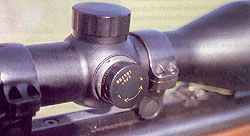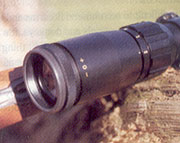
Lynx SP 1.5-6x50 XP
In the past four to five years the range of telescopic sights, binoculars
and spotting scopes offered by Lynx Optics has become established as some
of the best value for money optical products available in Australia.
This is particularly true of the range of telescopic sights. New models are
coming on-line regularly and of the latest is the SP 1.5-6x50 XP.
The 1.5-6x50 is the latest edition to the professional series of Lynx scopes. Like all scopes in the series it has a mattle-black finish one-piece aircraft grade aluminum tube. All lens surfaces are multi-coated for superior light and sharp image transmission, providing excellent contrast across the lens clarity.
Internally an improved alloy gimbal system ensures accuracy and reliability with an increased resistance to recoil. A precision tracking system ensures positive and accurate windage and elevation adjustments as well as providing a reliable return to zero repetition.
Length wise it is relatively compact, measuring just 300mm overall. That length, together with a 50mm objective lens, 30mm tube and a relatively large diameter adjustment ring and ocular bell gives the scope a squat, business like appearance. I regard scopes of this size and power range as ideal for hunting – especially under conditions where ranges and light conditions can vary considerably during the course of a day.

The 50mm objective lens delivers all the light ever needed, including when hunting under low natural light. The exit pupil – the column of light transmitted through the scope to the eye – is a massive 33.3mm on 1.5X. On 6X it drops back to a more realistic 8.3mm which is still more light than average healthy eye can distinguish. A significant advantage to having such a large exit pupil across the full magnification range is that eye alignment is not an issue when using the scope. When you look through it you get a full sight picture every time.
In line with the compact overall length of the scope the 30mm tube has an adjustment range of just 35mm between the turrets and the objective bell. You have to expect that on scopes such as this and select your scope mounts accordingly.
On the subject of 30mm tubes it’s worth noting that a 30mm tube does
not allow more light to pass through the scope to the eye than an inch or
a 26mm tube. Exit pupil is determined by the relationship between magnification
and the diameter of the objective lens. (Exit pupil = diameter of the objective
lens ion millimetres divided by the power).
The main benefit of a 30mm tube is to provide more room internally for windage
and elevation adjustments.
The review scope s fitted with an XP reticle. This is a European style reticle with a heavy bar at three, six and nine o’clock and a fine line at 12. It’s a very practical arrangement that makes target acquisition easy, especially if you’re in a hurry.
Under normal light conditions the heavy bars naturally lead the eye into onto the fine central crosshair. When the light is low, those same bars give a visible reference point for aiming when the finer crosshairs have become lost in the gloom. Other reticle types are also available in the 1.5-6x50 and these are listed in specifications for the scope on the Lynx web site. Click here to see them.
The windage and elevation turrets are finger adjustable with click stops having a nominal value of one quarter of an inch or 7mm. Rotational direction is clearly marked on each with a double-ended arrow and the appropriate word directions.
With a diameter of 42mm the power change ring is quite beefy like the rest
of the scope, its circumference fluted to provide a firm grip when changing
magnification. As noted above, the magnification range is an excellent choice
for hunting!
On the 1.5X the scope can be used with both eyes open for running or close-up
game, while the 6X setting is good enough to allow deliberate sniping shots
at game that is further out.
The ocular bell has a diameter of 44mm and is fitted with a rubber padded, screw-in-screw-out diopter for fine individual eye adjustment. The diopter has an adjustment ranger of about one and a half turns or 10mm which is ample for most people if the scope is set up properly in the first place.
For range testing the 1.5-6x50 XP was set only on my No.1 Ruger in.458 replacing the 1.6-6x42 Lynx that lived on this rifle for the past three years. Ammunition used was a handload consisting of 77gns AR2208 with 400-gn Woodleigh PP SN bullets, a load that routinely shoots less than MOA in this rifle.
Getting the bullet to print on the target at the right height above the bull took only six shots. The reticle answered to adjustments precisely, making sighting in an easy process – an important consideration when you’re shooting a .458 off the bench, padded should bags or not. The final three-shot group measured just on 25mm and while I know the rifle will group tighter than that if I do my own job properly, with a hunting trip arranged for the next day I called it good enough.
Like the 1.5-6x42 that proceeded it, the 1.5-6x50 is a scope that will find
favour with a lot of hunters. With its magnification range it can be used
effectively over a wide range of hunting conditions with the lower settings
ideal for running game like pigs in the lignum or goats in the scrub. In the
mountains it’s an excellent choice for deer hunters who prowl around
the thick stuff or work on the edge country early in the morning or late in
the evening where low-light conditions are the norm. Like all Lynx products
I’ve looked at, I consider it to be excellent value for money.
By John Dunn, HUNTER Magazine, Edition VIII, 2004
